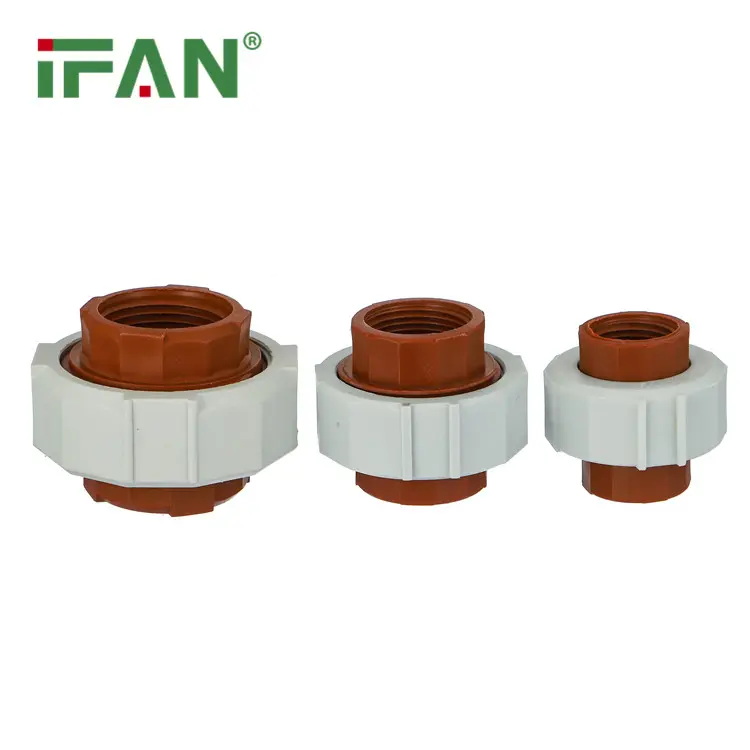Are you searching for reliable IPS PPH unions for your industrial projects? Look no further. High-quality polypropylene homopolymer (PPH) unions deliver exceptional performance in demanding applications.
What Are IPS PPH Unions?
IPS PPH unions are threaded pipe fittings designed for easy assembly and disassembly. They connect two pipe sections while allowing future maintenance access. The Iron Pipe Size (IPS) threading ensures compatibility with standard plumbing systems.
PPH material offers superior chemical resistance. It withstands temperatures up to 100°C (212°F). The homopolymer structure provides excellent mechanical strength and durability.
Key Benefits of Quality PPH Unions
Resistencia química
PPH unions resist acids, bases, and organic solvents. They maintain integrity in harsh chemical environments. This makes them ideal for industrial processing applications.
Temperature Performance
These fittings handle both hot and cold fluids effectively. Thermal expansion properties remain stable across temperature ranges. Long-term performance stays consistent.
Easy Installation
Threaded connections require no special tools. Hand-tight assembly provides secure joints. Disassembly for maintenance takes minutes, not hours.
Cost-Effective Solution
PPH unions offer excellent value compared to metal alternatives. Lower material costs reduce project budgets. Minimal maintenance requirements save operational expenses.
Applications for IPS PPH Unions
Chemical Processing Plants
- Acid handling systems
- Base neutralization lines
- Solvent transfer applications
Water Treatment Facilities
- Distribution networks
- Filtration systems
- Chemical dosing lines
Industrial Manufacturing
- Cooling water circuits
- Process fluid handling
- Waste treatment systems
Laboratory Installations
- Fume hood connections
- Chemical waste lines
- Pure water systems
Quality Standards to Consider
Look for unions meeting international standards. ISO 15494 certification ensures dimensional accuracy. ASTM D2846 compliance guarantees material properties.
Wall thickness specifications matter significantly. Standard Dimension Ratio (SDR) ratings indicate pressure capabilities. Choose appropriate ratings for your system pressure requirements.
Thread quality affects long-term performance. Precision-machined threads prevent leakage issues. Smooth thread surfaces reduce installation effort.

Installation Best Practices
Clean pipe ends thoroughly before assembly. Remove any debris or manufacturing residue. Dry fitting helps identify alignment issues early.
Apply thread sealant appropriately. Use compatible compounds that won’t damage PPH material. Avoid over-tightening which can crack the fitting.
Support heavy pipe runs adequately. Unions shouldn’t bear structural loads. Proper support extends fitting lifespan significantly.
Maintenance and Inspection Guidelines
Regular visual inspections detect early wear signs. Check for cracks, discoloration, or deformation. Replace fittings showing stress indicators immediately.
Monitor joint tightness periodically. Thermal cycling can affect threaded connections. Gentle re-tightening may be necessary over time.
Document replacement schedules for critical applications. Preventive replacement prevents unexpected failures. Keep spare inventory for emergency repairs.
Why Free Samples Matter
Quality assessment requires physical evaluation. Samples let you verify material properties firsthand. Thread fit and finish become immediately apparent.
Testing sample fittings in actual conditions provides valuable data. Performance characteristics become clear through real-world evaluation. This reduces procurement risks significantly.
Sample testing also validates supplier capabilities. Manufacturing quality becomes evident through detailed examination. This builds confidence in larger orders.
Selecting the Right Supplier
Experience in PPH manufacturing matters tremendously. Established suppliers understand material properties better. They provide technical support when needed.
Quality control processes ensure consistent products. Regular testing maintains specification compliance. Certification documentation proves quality standards.
Custom sizing capabilities add significant value. Standard sizes don’t fit every application. Modification services solve unique installation challenges.
Common Sizing Options
Standard IPS Sizes:
- 1/2 inch through 6 inch diameters
- NPT and BSPT thread options
- Various pressure ratings available
Custom Configurations:
- Non-standard dimensions
- Special thread types
- Modified end connections
Cost Considerations
Initial cost represents only part of total ownership expenses. Installation labor affects project budgets significantly. Easy-to-install fittings reduce labor costs.
Maintenance requirements impact long-term costs. Quality fittings need less frequent replacement. Downtime costs often exceed fitting costs.
Energy efficiency considerations matter in pumped systems. Smooth internal surfaces reduce pressure losses. Lower pumping costs offset higher fitting costs.
Technical Specifications to Review
Material Properties:
- Tensile strength: 30-35 MPa
- Operating temperature: -10°C to 100°C
- Chemical compatibility charts available
Pressure Ratings:
- Working pressure varies by size
- Safety factors built into ratings
- Temperature derating factors apply
Dimensional Standards:
- ANSI/ASME B1.20.1 thread specification
- ISO 228 parallel thread options
- Custom dimensions available
Quality Assurance Processes
Reputable manufacturers implement comprehensive testing programs. Raw material verification ensures specification compliance. In-process inspections catch defects early.
Final inspection includes dimensional checks and pressure testing. Hydrostatic testing validates pressure ratings. Thread gauging ensures proper fit.
Documentation packages provide traceability. Material certificates confirm property specifications. Test reports validate performance capabilities.
Consideraciones medioambientales
PPH material offers excellent environmental characteristics. It’s fully recyclable at end-of-life. No toxic additives create disposal concerns.
Manufacturing processes generate minimal waste. Energy requirements stay relatively low. Transportation impacts remain small due to lightweight construction.
Chemical resistance eliminates leaching concerns. Potable water applications receive regulatory approval. Food-grade versions meet FDA requirements.
Conclusión
Free samples of quality IPS PPH unions provide the best evaluation method. They demonstrate material properties and manufacturing quality directly. This reduces procurement risks and ensures project success.
Partner with experienced manufacturers who understand your requirements. Quality products, technical support, and reliable delivery create successful partnerships. Request your free samples today to experience the difference quality makes.
Contact established PPH fitting manufacturers for detailed technical information. Discuss specific application requirements with their engineering teams. Professional guidance ensures optimal fitting selection for your project needs.













Comentarios recientes